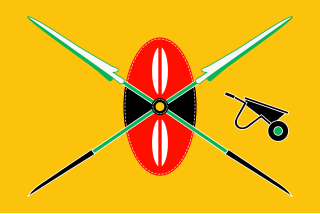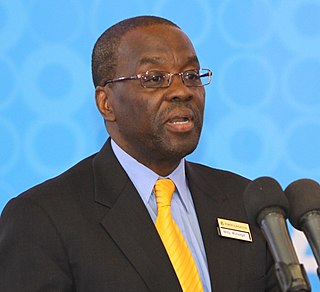
The politics of Kenya take place in a framework of a presidential representative democratic republic, whereby the president is both head of state and head of government, and of a multi-party system in accordance with a new constitution passed in 2010.

Emilio Mwai Kibaki was a Kenyan politician who served as the third President of Kenya from December 2002 until April 2013.

The president of the Republic of Kenya is the head of state and head of government of the Republic of Kenya. The President is also the head of the executive branch of the Government of Kenya and is the commander-in-chief of the Kenya Defence Forces.

Uhuru Muigai Kenyatta is a Kenyan politician who served as the fourth president of Kenya from 2013 to 2022.

Stephen Kalonzo Musyoka is a Kenyan politician who was the tenth Vice-President of Kenya from 2008 to 2013. Musyoka served in the government under the late President Daniel arap Moi as the Secretary of Kenya African National Union party (1980-1988), Assistant Minister for Works (1986-1988), Deputy Speaker of the National Assembly (1988-1992), Minister for Foreign Affairs from 1993 until 1998, Minister of Education (1998-2001); and subsequently, under the late President Mwai Kibaki, he was Minister of Foreign Affairs again from 2003 to 2004, then Minister of the Environment from 2004 to 2005. He was an unsuccessful candidate in the 2007 presidential election, after which he was appointed vice-president by Kibaki in January 2008.

Corruption in the government of Kenya has a history which spans the era of the founding president Jomo Kenyatta, to Daniel arap Moi's KANU, Mwai Kibaki's PNU governments. President Uhuru Kenyatta's Jubilee Party government, and the current William Ruto's Kenya Kwanza administration has also been riddled with massive cases of graft.

George Musengi Saitoti, E.G.H. was a Kenyan politician, businessman and American- and British-trained economist, mathematician and development policy thinker.

Lesbian, gay, bisexual, and transgender (LGBT) persons in Kenya face significant challenges not experienced by non-LGBT residents. Sodomy is a felony per Section 162 of the Kenyan Penal Code, punishable by 21 years' imprisonment, and any sexual practices are a felony under section 165 of the same statute, punishable by 5 years' imprisonment. On 24 May 2019, the High Court of Kenya refused an order to declare sections 162 and 165 unconstitutional. The state does not recognise any relationships between persons of the same sex; same-sex marriage is banned under the Kenyan Constitution since 2010. There are no explicit protections against discrimination on the basis of sexual orientation and gender identity. Adoption is prohibited to same-sex couples.

John Njoroge Michuki was a Kenyan politician and businessman. He was born at Muguru, village, Iyego Location, Kangema Division in Murang’a District. He was educated in Kenya and abroad. Michuki emerged as one of the prominent and long-serving civil servants and politicians as well as a businessman in Kenya. Michuki served Kenya in various capacities, including Permanent Secretary in the Finance Ministry, Chairman of the Kenya Commercial Bank, Member of Parliament and Cabinet Minister. He was serving his 4th five-year term as a Member of Parliament for Kangema Constituency. Michuki had a reputation as a "ruthless" and efficient manager, and was widely acknowledged as among the best performing ministers in President Kibaki's Government. He was serving as the Minister for Environment and National Resources at the time of his death.
The 2007–2008 Kenyan crisis was a violent political, economic, and humanitarian crisis that erupted in Kenya after former President Mwai Kibaki was declared the winner of the presidential election held on December 27, 2007. Supporters of Kibaki's main opponent in that election, Raila Odinga of the Orange Democratic Movement, alleged electoral manipulation. This position was widely confirmed by international observers, as being perpetrated by both parties in the election. Even the head of the electoral commission himself confirmed that he did not know who had won the elections despite announcing the incumbent as president.

Kenya Vision 2030 is a Kenyan development program, aiming to raise the average standard of living in Kenya to middle income by 2030. It was launched on 10 June 2008 by President Mwai Kibaki. Developed through "an all-inclusive and participatory stakeholder consultative process, involving Kenyans from all parts of the country," the Vision is based on three "pillars": Economic, Social, and Political. The Vision's adoption comes after the country's GDP growth went from 0.6% in 2002 to 6.1% in 2006, under Kibaki's Economic Recovery Strategy for Wealth and Employment Creation (ERS).

The Government of the Republic of Kenya (GoK) is the national government of the republic of Kenya which is composed of 47 Counties, each county with its own semi-autonomous governments. The national government is composed of three arms: The Legislature, the Executive and the Judiciary. Each arm is independent of the other and their individual roles are set by the Constitution of Kenya. The full name of the country is the "Republic of Kenya". Its official Swahili name is 'Jamhuri ya Kenya'. Other terms such as GoK, GK and Serikali are popularly used to refer to the Kenyan government.

The Constitution of Kenya is the supreme law of the Republic of Kenya. There have been three significant versions of the constitution, with the most recent redraft being enabled in 2010. The constitution was presented to the Attorney General of Kenya on 7 April 2010, officially published on 6 May 2010, and was subjected to a referendum on 4 August 2010. The new Constitution was approved by 67% of Kenyan voters. The constitution was promulgated on 27 August 2010.

General elections were held in Kenya on 4 March 2013. Voters elected the President, members of the National Assembly and newly formed Senate. They were the first elections held under the new constitution, which was approved in a 2010 referendum, and were also the first run by the new Independent Electoral and Boundaries Commission (IEBC). They coincided with the 2013 Kenyan local elections.

Willy Munyoki Mutunga is a Kenyan lawyer, intellectual, reform activist, and was the Commonwealth Special Envoy to the Maldives. He is also an active member of the Justice Leadership Group. He is the retired Chief Justice of Kenya and President of the Supreme Court of Kenya.

The Counties of Kenya are geographical units created by the 2010 Constitution of Kenya as the new units of devolved government. They replaced the previous provincial system. The establishment and executive powers of the counties is provided in Chapter Eleven of the Constitution on devolved government, the Constitution's Fourth Schedule and any other legislation passed by the Senate of Kenya concerning counties. The counties are also single-member constituencies which elect members of the Senate, and special woman members to the National Assembly.
The Truth, Justice and Reconciliation Commission of Kenya (TJRC) was established in 2008. Kenya’s modern history has been marked not only by liberation struggles but also by ethnic conflicts, semi-despotic regimes, marginalization and political violence, including the coup d'état of 1982, the Shifta War, and the 2007 Post-election violence.

The Independent Electoral and Boundaries Commission (IEBC) is an independent regulatory agency that was founded in the year 2011 through the making of the Constitution of Kenya. The Commission is responsible for conducting or supervising referendums and elections to any elective body or office established by the Constitution, and any other elections as prescribed by an Act of Parliament. It was created in a provision of the 2010 constitution and the Independent Electoral and Boundaries Commission Act. Its mandate includes "the continuous registration of voters and revision of the voter's roll, the delimitation of constituencies and wards, the regulation of political parties process, the settlement of electoral disputes, the registration of candidates for elections, voter education, the facilitation of the observation, monitoring and evaluation of elections, the regulation of money spent by a candidate or party in respect of any election, the development of a code of conduct for candidates and parties, [and] the monitoring of compliance with legislation on nomination of candidates by parties."
Dr. Nancy Makokha Baraza is a former Kenyan judge. She was the first Deputy Chief Justice of Kenya and a member of Kenya's first supreme court after the promulgation of the 2010 Constitution. She served in the court from June 2011 to her suspension in January 2012 and subsequently resigned on 18 October 2012. She was appointed to the Kenya Law Reform Commission in 2008 for a term of three years, serving as a vice chairperson until her appointment as deputy CJ. In early 2010, she was elected chairperson of the Media Council of Kenya’s Ethics and Complaints Commission.

Sub-counties are the decentralised units through which county governments of Kenya will provide functions and services. Except for the parts which fall under urban areas, sub-counties will coincide with the constituencies created under article 89 of the Constitution of Kenya. Sub-counties will be headed by a sub-county administrator, appointed by a County Public Service Board.













